Karachi has been ranked as the fourth least habitable city in the world, according to Livability Index 2025 released Tuesday by Economist Intelligence Unit (EIU), a research arm at The economist Group.
Karachi was placed 170. Out of 173 cities assessed globally, and was the only Pakistani city included in the index. It ranked just above Dhaka (Bangladesh), Tripoli (Libya) and Damascus (Syria) that retained the bottom position.
The EIU’s Liveability Index evaluates cities across five categories – stability, healthcare, culture and environment, education and infrastructure – using more than 30 indicators to reach the final scores.
Copenhagen was named the most habitable city in the world and earned almost perfect scores in stability, education and infrastructure with a total score of 98 out of 100.
Read more: Karachi ranks among least habitable cities in Global Survey again
It replaced last year’s leader, Vienna, who fell to second place due to two foiled terrorist attacks that affected its stability result. Zurich tied with Vienna in second place, while Geneva rounded off the top five and emphasized the dominance of Western European cities in the index.
Melbourne, with a score of 97, was the only non-European city that broke into the top five that ranked the fourth. Other cities in the southern hemisphere highlighted prominent in the top ten, including Sydney (6.), Osaka (7.), Auckland (8.) and Adelaide (9.). Vancouver (10.) was North America’s only representative at the top level.
Several cities in the UK – including London, Manchester and Edinburgh – then decrease in their positions, attributed to widespread civil unrest and rising homelessness. London and New York were ranked as 54 and 69 respectively.
Canadian cities also fell into the rankings, largely due to lower health results everywhere.
The report noted that the Middle East showed the most significant improvement, driven by improvements in healthcare and education in Saudi Arabia and UAE.
In South Asia, most cities ranked poorly, with EIU citing high pollution levels, extreme temperatures and regional tensions. Continuous military confrontations along the Kashmir border contributed to lower stability results for more Indian cities.
Damascus remained at the bottom of the list. However, EIU suggested that the situation could improve in future editions following the withdrawal of Bashar al-Assad in December and the subsequent easing of US sanctions.
The report concluded that although the inflation pressure was somewhat relieved, rising geopolitical tensions were new risks of urban stability and the overall quality of life in many regions.



